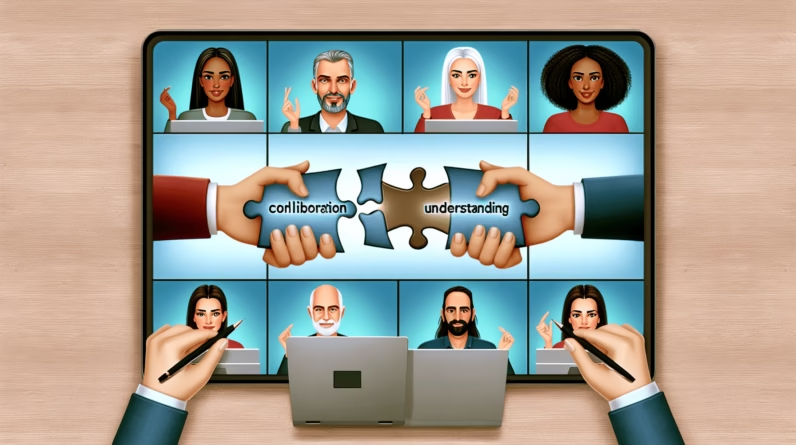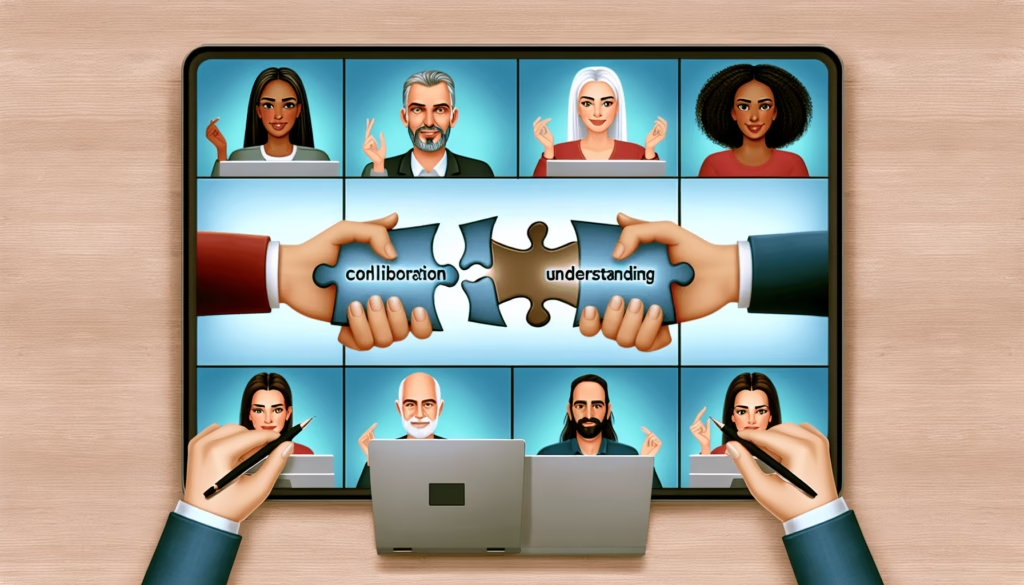
What do you do when a disagreement arises within your remote team?
In today’s digital workspace, conflicts are bound to happen, whether it’s about project timelines, communication styles, or differing opinions. Navigating these disputes effectively can foster a more collaborative environment. Let’s discuss some practical strategies you can implement to handle conflicts in remote teams.

Learn More About Conflict Resolution
Table of Contents
Understanding Conflict in Remote Teams
Conflicts can stem from varied sources, particularly when team members work virtually. Miscommunication, cultural differences, and lack of non-verbal cues often exacerbate misunderstandings in a remote setting. Recognizing the root causes of conflict is the first step to resolving them.
Common Causes of Conflict
-
Communication Breakdown: Poor communication is often the biggest culprit. Without face-to-face interactions, messages can be misinterpreted.
-
Cultural Differences: Team members might come from diverse backgrounds, leading to different working styles and assumptions.
-
Role Ambiguity: Unclear roles and responsibilities can create friction, as team members may have different ideas about who should do what.
The Importance of Addressing Conflict
Ignoring conflict only allows it to fester and grow. When left unresolved, it can affect team morale and productivity. Addressing conflicts openly can lead to improved relationships and a stronger team dynamic.
Benefits of Resolving Conflicts
-
Enhanced Communication: When you approach conflicts, it improves overall communication within the team.
-
Strengthened Relationships: Resolving disagreements can build trust and strengthen relationships among team members.
-
Increased Productivity: A harmonious team is generally more productive, as members can focus on tasks rather than interpersonal issues.
Explore Effective Strategies For Remote Teams
Conflict Resolution Strategies for Remote Teams
Here are some effective strategies you can utilize to manage conflicts in remote teams:
1. Foster Open Communication
Creating a culture of openness encourages team members to voice their thoughts and concerns. You can facilitate this by regularly checking in with your team, either through one-on-ones or team meetings.
Tips for Encouraging Open Communication:
-
Use Video Calls: Whenever possible, opt for video conferencing instead of relying solely on chat or emails; this helps reinforce personal connections.
-
Create Safe Spaces: Provide forums or virtual spaces for team members to express their feelings without fear of negative repercussions.
-
Encourage Active Listening: Remind team members to practice active listening by summarizing what others say to ensure understanding.
2. Clarify Roles and Responsibilities
To reduce role ambiguity, make sure everyone knows their responsibilities as well as those of their teammates. This clarity can prevent many conflicts from arising in the first place.
Steps to Clarify Roles:
-
Define Roles: Clearly outline each team member’s role in project documentation.
-
Regularly Review & Adjust: As projects evolve, revisit roles and responsibilities to accommodate any changes.
-
Use Project Management Tools: Tools like Trello or Asana can help everyone visualize their tasks and understand team dynamics better.
3. Address Issues Early
Don’t let problems build up. When you notice signs of conflict, address them promptly rather than allowing them to escalate.
How to Address Issues Early:
-
Be Attentive: Pay attention to team dynamics and look for signs of mounting tension or discomfort.
-
Quick Check-Ins: Use brief one-on-one sessions to discuss any emerging issues with individuals directly.
-
Encourage Dialogue: Facilitate constructive conversations where team members can express their concerns openly.
4. Promote Team Building Activities
Engaging in team-building activities can strengthen relationships among team members, making it easier to resolve conflicts when they arise.
Ideas for Team-Building Activities:
-
Virtual Icebreakers: Start meetings with a quick icebreaker activity to lighten the mood.
-
Team Challenges: Plan fun challenges or trivia quizzes where everyone can participate, fostering team spirit.
-
Monthly Check-Ins: Dedicate time for informal gatherings to get to know one another beyond work.
5. Implement Conflict Resolution Techniques
Having established methods for conflict resolution helps to facilitate smoother interactions among team members during disagreements.
Common Techniques You Can Use:
| Technique | Description |
|---|---|
| Collaboration | Work together to find a solution that satisfies everyone. |
| Compromise | Each party gives up something to reach an agreement. |
| Avoidance | Sometimes, it can be helpful to remain neutral and avoid escalation until things cool down. |
| Accommodation | One party agrees to accommodate the other’s request. |
| Competition | This isn’t always ideal, but sometimes firmly standing your ground can make a point. |
Each technique has its place, and depending on the situation, you can choose the one that fits best.
6. Encourage Empathy
Encouraging team members to step into each other’s shoes can foster a better understanding of different perspectives and reduce hostility.
Ways to Promote Empathy:
-
Share Personal Experiences: Have team members share a brief story about a conflict they faced and how they resolved it.
-
Empathy Mapping: Use empathy mapping exercises to visualize and understand emotions and experiences.
7. Utilize Mediation
If the conflict escalates beyond what team members can handle, mediation might be necessary. A neutral third party can help facilitate discussions and lead to resolutions.
Steps for Effective Mediation:
-
Select a Mediator: Choose someone respected by all parties, maybe a manager or an HR representative.
-
Set Ground Rules: Ensure everyone understands the mediation process and agrees to share their viewpoints respectfully.
-
Maintain Confidentiality: Stress that what’s discussed during mediation stays confidential to protect everyone involved.
8. Resolve Conflict with Data
Sometimes, disputes stem from different interpretations of data or project outcomes. Use objective data to guide discussions, focusing the conversation on facts rather than emotions.
How to Use Data in Conflict Resolution:
-
Document Performance Metrics: Keep track of relevant project metrics that can back up claims.
-
Analyze Data Collectively: Involve the entire team to analyze data and draw conclusions collectively.
9. Foster a Culture of Continuous Feedback
Encouraging a culture of consistent and constructive feedback can mitigate conflicts over time and promote a healthy work atmosphere.
Implementing Continuous Feedback:
-
Regular Check-Ins: Schedule regular feedback sessions that aren’t only reserved for performance reviews.
-
Train Team Members: Provide training on how to give and receive feedback effectively.
10. Know When to Escalate
Sometimes, conflicts might become too complicated or toxic to handle internally. It’s important to know when to involve higher management or human resources.
Recognizing the Need to Escalate:
-
Persistent Issues: If the conflict drags on despite your efforts, it may be time to reach out for external assistance.
-
Impact on Productivity: If the conflict interferes significantly with work performance, it’s essential to escalate matters sooner rather than later.
Building Conflict Resolution Skills
As a leader or a team member, honing your conflict resolution skills is crucial for creating a harmonious workplace. Here are some skills you can focus on:
Effective Communication
Communicating clearly and assertively can prevent misunderstandings and promote healthier dialogue during conflicts.
Emotional Intelligence
Enhancing your emotional intelligence will enable you to manage your emotions and recognize the feelings of others, which can facilitate better conflict resolution.
Problem-Solving Skills
Developing your problem-solving skills can help you approach challenges rationally and collaboratively, making it easier to find solutions.
Negotiation Skills
Understanding negotiation techniques can enable you to navigate conflicts constructively and reach mutually beneficial agreements.
Conclusion
Conflict in remote teams is inevitable, but it can also be manageable. By fostering open communication, clarifying roles, and employing effective resolution strategies, you can transform disputes into opportunities for growth and teamwork. Focusing on understanding, empathy, and clear communication will serve as your toolkit for ensuring conflicts lead to stronger, more cohesive collaborations.
Now that you have a clearer outline of how to handle conflicts in remote teams, it is time to put these strategies into action. Your team’s productivity and morale are at stake, and it’s worth the effort to cultivate a positive and healthy working environment.







